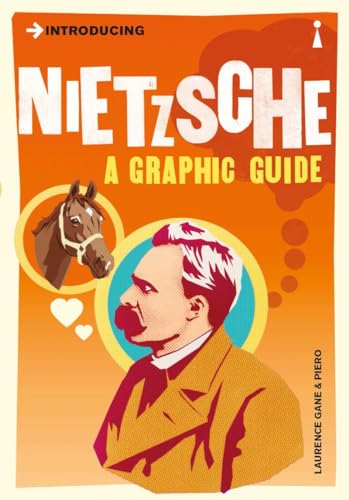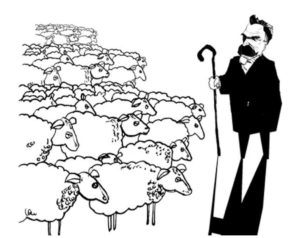
Full Title: Introducing Nietzsche: A Graphic Guide
Author / Editor: Laurence Gane
Publisher: Icon Books, 2014
Review © Metapsychology Vol. 24, No. 41
Reviewer: Bob Lane
This is one of a series of useful texts on various philosophical topics. These illustrated works are a real joy to read and to look at! The illustrations are a great addition to some, at times, difficult discussions of complex philosophical problems – and always eye-catching and appropriate. I want to list the contents so you can have a notion of the ideas discussed:
Cover
Title Page
Copyright
Early Years Schopenhauer: the Denial of Life
The Scholar as Anti-Scholar
The Birth of Tragedy from the Spirit of Music
Apollo and Dionysus Music, the Origin of Myth Music and Tragedy
The Triumph of Apolline Philosophy
The Case of Richard Wagner
What is History? What is Education? What is Culture?
A Critique of Metaphysics Kant’s Idealism
Kant’s Spectacles
Kantian Morality: You Know it Makes Sense
Nietzsche’s Style Lightness of Touch
The Aphorism
On Readers
The Price of Knowledge
The Eternal Return
Nietzsche and Women
The Micro-histories of Daily Life
Is Virtue a Virtue?
The Power of the Herd
The Death of God
Life Without God?
A Critique of Science
The Methods of Science
From Description to Image
The Psychoanalysis of Knowledge
Anti-Darwinian Evolution
The Evolution of Quality Politics: Morality and the State
The Paradox of Democracy
Invitation to a Political Party
Politics: the Prostitution of the Intellect Politics: the Death of Truth
Thus Spake Zarathustra
The Oracle Speaks
On Nihilism
On Virtuous Hypocrisy
On Fear
What is “The Superman”?
Mastery of the Self
A Human or Post-Human Future?
The Will to Power
Self-Obedience
The Free Spirit
The Circle of Time
A Pessimistic Consolation
Wagner’s Shadow
The Germans and the Jews
Anti-Germany
Beyond Good and Evil (1885–6)
The Dishonesty of Philosophy Of Religion
Of Faith
Making the Most of Suffering
On the Natural History of Morals
The Ruler as Servant
Evil On Madness
On Love
On Truth
On Morality
The Master and the Slave
Noble Ethics
Slave Ethics
The Man Apart
The Genealogy of Morals
The Ethics of pity
The Slave Revolt in Ethics
The Sins of the Fathers
Slave Ethics: the Inversion of Values
The Idea of evil
The Rancour of the Weak
Two Views of the Enemy
The Origins of conscience
The Disease of Consciousness
The Origin of “Good”
The Ascetic Ideal
The Anti-Christ
Recognition at Last?
Nietzsche’s Breakdown
Nietzsche and the Nazis
The Case for the Defence
Nietzsche and Psychoanalysis
Wittgenstein: Linguistic Philosophy
Heidegger and Nietzsche
Jean-Paul Sartre: Existentialism
Le Néant Derrida: Deconstruction
Foucault: Knowledge and Power
Foucault’s Micro-Histories
Nietzsche and Postmodernism (Postmodern)
Theory Wars
The Simulacrum Postmodern
Hyper-reality
A Postmodern Fable
Further Reading
Acknowledgements
About the Author and Index
As you can see there are many short chapters each complete with excellent illustrations which add to the discussion and provide an occasional laugh as well as insights into the material being discussed. An excellent book for an introduction to existentialism class.
Here is one of the illustrations to give you a sense of how they contribute to the work:
And I am sure you can see what the topic of discussion is at this point! I realize that simply listing the contents is a bit strange, but in this case it seems to this reviewer to be the best way to show you what to expect.
Nietzsche’s Genealogy of Morals continues to be a must-read for the twenty-first century. One of the ideas discussed is captured here:
“… ever since there have been human beings there have also been human herds (family groups, communities, tribes, nations, states, churches), and always very many who obey compared with the very small number of those who command – considering, that is to say, that hitherto nothing has been practised and cultivated among men better or longer than obedience, it is fair to suppose that as a rule a need for it is by now innate as a kind of formal conscience which commands: Thou shalt unconditionally do this, unconditionally not do that, in short ‘Thou shalt’. This need seeks to be satisfied and to fill out its forms with a content: in doing so it grasps about wildly, according to the degree of its strength, impatience and tension, with little discrimination, as a crude appetite, and accepts whatever any commander – parent, teacher, law, class prejudice, public opinion – shouts in its ears.”
An interesting and informative book with the added feature of illustrations.
Bob Lane is a Professor Emeritus, Philosophy at Vancouver Island University.
Categories: Philosophical
